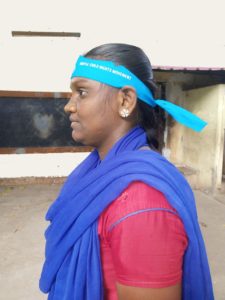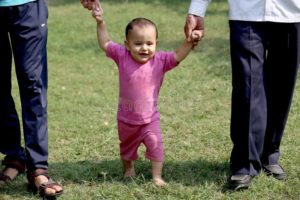
Here is the story of Dhanalakshmi from Madurai, a city in the State of Tamil Nadu, India. She is now 17 and typically not in the age group of CONNECT readers. But she is a remarkable girl for what she has achieved already and should be a source of inspiration for children everywhere. Beating all odds, she has finished school, the first in her family. Child rights are not empty words; she is well aware of her rights as a child and is not afraid to speak up when she feels these rights are being violated. She is ambitious not only about her future but about changing society for the better.
Not afraid to fly
“When I was in Grade 11, one teacher would hit the children for no reason, and often. I told my classmates that the teacher’s action was unacceptable and wrong. I persuaded them to sign a letter, all but one did. We then went home that day and some of us called Childline on 1098 (a toll-free helpline for children in distress) around the same time and complained about the teacher. Based on our complaint, authorities conducted an enquiry the very next day and the teacher was warned. The following day when we came to school, that teacher was not there. And she never came back after that! The headmistress did talk about the incident in the school assembly, saying some children were doing things which was not their responsibility. We knew she was referring to us.” As she says this, M. Dhanalakshmi laughs, aware that she and her classmates had done the right thing.
The teenager from Madurai in the state of Tamil Nadu, India, is a first-generation learner coming from one of the most socially and economically marginalized communities in India. The 17-year-old has just finished school and enrolled for an undergraduate course in social work. Her ambition is to become a police officer.
The teenager’s parents are both school dropouts having not finished even elementary school. Dhanalakshmi’s father sells tender coconuts on a tricycle, earning around Rs. 200 (less than 3 Euros) on good days. “But when it rains, he cannot sell the coconuts as no one wants to buy the coconut water,” says the girl. Her mother works in a unit making rubber washers and earns around Rs.6000 a month (around 65 euros). Despite the hardship, Dhanalakshmi’s parents do not make any compromises with the education of their three daughters. “My uncle, other extended family members keep telling my parents to get my elder sister married. They don’t heed such words. My mother always says, ‘I couldn’t study, you make sure you study what you want’. She understands the importance of education,” says the teenager.
Dhanalakshmi has been a member of the children’s movement called Vidiyal Child Rights Movement initiated by Sakthi-Vidiyal, an NGO in Madurai working on child rights and social inclusion. Through this association, the girl learnt about her rights as a child. “When I was in Grade 8, Vidiyal taught me what child rights meant. We were taught about different issues, to think about how to approach these and find solutions.” This was valuable as Dhanalakshmi gradually shed her fear and learnt to ask questions.
The girl is proud that not only has she learnt about her rights but she takes every opportunity to talk to her friends about what she has learnt. She recalls: “We really didn’t have much free time in the school but sometimes a teacher wouldn’t show up for class. Then I would tell my classmates about Childline, the games we played at Vidiyal to learn about child rights, etc.”
However, the girl is also candid about the not-so-positive experiences she has had. When she was in Grade 10, Dhanalakshmi learnt through friends that Sathya, a classmate from Kaluvankulam village, was being married off. She, of course, dialled Childline and informed them. Childline personnel visited the girls’ parents, warned them against getting their 15-year-old married and took a written statement from them that they wouldn’t try to marry their daughter before she turned 18 years of age. However, a few months later, the parents did just that and got their daughter married quietly.
Dhanalakshmi was crestfallen when she heard the news. Soon after, at an interaction, she confronted Childline officials and asked them why they had failed to stop Sathya’s marriage. The Childline officials admitted that they could have been more stringent in following up with the parents and promised her that they would do so in the future.
Dhanalakshmi is firm that she will not allow discrimination on the basis of her caste. She said: “A classmate once asked me what my caste was. I asked her back ‘will you talk to me only if you know my caste’ and the girl kept quiet. Once when I came back with a friend after visiting a temple built by so-called upper caste people, the girl’s mother asked her why she had been to the temple with me, a Scheduled Caste girl. That upset me. But I know now that I will not remain quiet about my caste identity and will take action under laws created specifically to prevent and punish atrocities against marginalised communities.” She knows about affirmative action such as the reservation policy for socially marginalised groups in education and jobs and intends to make use of it as an enabler to pursue her ambition and grow out of her caste identity.
Indeed, the teenager wants to do a Master’s in Social Work and then join the Indian Police Service. Ask her about the combination and pat comes the reply, “I want to learn about social issues first that will help me do better as a police officer. The image of the police force and, in particular, that of women in the force is not good. In films too, we see stereotypes of corrupt police officials. I want to change that.”
The girl, who likes storytelling a lot and won prizes too for her talent, says children must be made aware of their rights and taught to ask questions, and to not just accept things as they are.
(Transcription of audio interview with Dhanalakshmi in Tamil)










